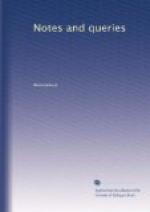Sir,—As I see this matter is not yet explained, I venture a suggestion. Wheat straw was an emblem of peace among heathen nations; in it the first-fruits brought by Abaris the Hyperborean to Delos were wrapped; and when commerce, or rather trade by barter, had rendered transmission from hand to hand practicable, wheat straw was still used. With the worship of Diana the offering of wheat straw passed over to Thrace, where it was a recognition of that goddess as the patron of chastity. In Judea the wheat harvest was later than that of barley, the Jews therefore offered a sheaf of the latter grain as first-fruits; it is, however, extraordinary that Moses orders barley-meal as the offering for jealousy (Numbers, v 15.), though the price of barley was but half that of wheat. It seems as if there were the same connection between this peace-offering and that of the first-fruits with the Jews, that we see between the offering to Diana and the first-fruits of the Hyperboreans; both may have been derived from Egypt, in the learning of which, we are told, Moses was skilled. The straw necklace or chaplet of Erasmus’ pilgrim might be worn to secure him from molestation in travelling, or it may refer to the patroness of Walsingham, the Virgin Mary.
I dare say many persons have thought with me, that a poet’s promise of a “belt of straw” to his love, was not a very complimentary one; one possible meaning never struck me till this moment: it may be a compliment unconsciously drawn from a heathen source, and perpetuated, like so many of our old-world customs, among a class of people the least likely to understand the meaning.
Another corroboration of Macaulay’s Young Levite may be found in The Tatler, No. 255, sixty years later than Burton.
I beg to suggest a method of keeping “Notes,” which I have found useful. I have a blank book for each quarter of the world, paged alphabetically; I enter my notes and queries according to the subject for which they are most likely to be required; if relating to mere geography or history, under the name of place or person. I also keep a list (with dates) of all the books I read, with a note of any use to be made of them; I also keep a list of all books to be read, and the reasons for reading them. I tried various ways of keeping my notes, and found no classification so easy for reference as the plan I have mentioned; it may not, however, suffice to those whose reading is much more extensive than mine; I mention it as a working plan.
F.C.B.
* * * * *
ANSWERS TO MINOR QUERIES
Ancient Motto
Sir,—In your Sixth Number, p. 93, J.E.M. wishes to know whence the motto, “Si quis amicum absentum rodere delectat,” &c. is taken.
Allow me to refer your correspondent to Horace, Sat. I. iv. 81 sqq.
“Absentem
qui rodit amicum,
Qui non defendit, alio culpante,
*
* * * *
hic
niger est, hanc tu, Romane, caveto.”




